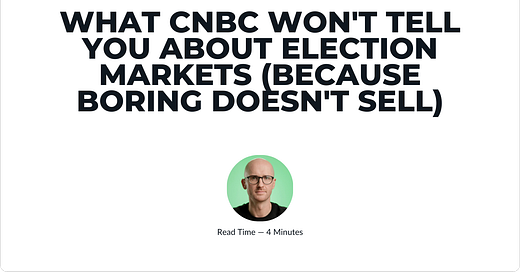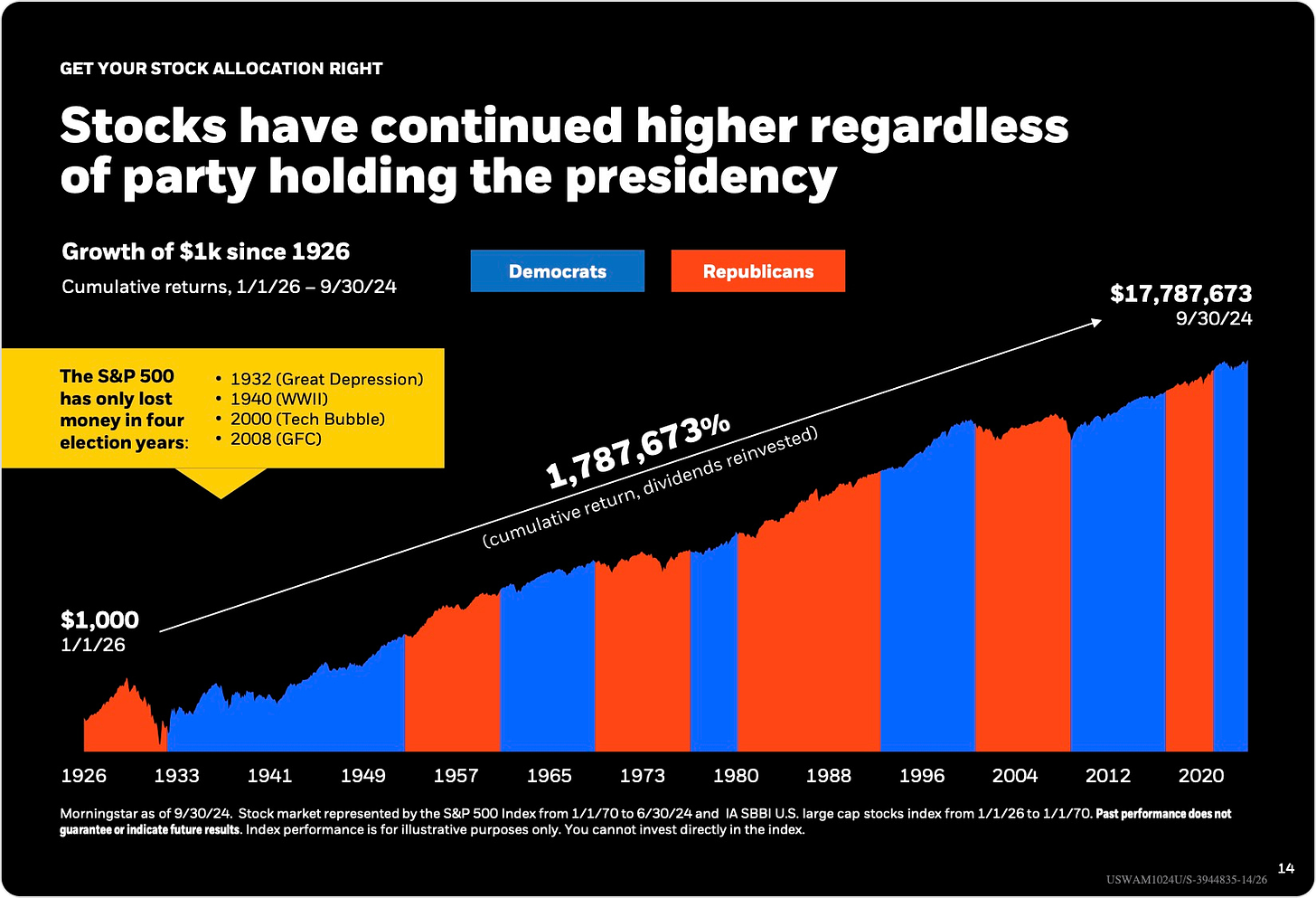What CNBC Won't Tell You About Election Markets (Because Boring Doesn't Sell)
What happens when you ignore the noise and follow systems instead
Every 4 years, the same story plays out:
Media gets loud
Markets get volatile
Investors get nervous
Smart money stays quiet
Here's the thing: Your anxiety around elections and markets isn't a character flaw — it's a natural psychological response that can be mastered.
As a Financial Advisor who's helped hundreds of clients navigate multiple election cycles, I've developed a framework that turns election anxiety into investment confidence.
Let me show you how the smart money thinks about this.
1. The Numbers Don't Lie: History Is Your Secret Weapon
Let me share something remarkable: A $1,000 investment in the S&P 500 made in January 1926 would have grown to precisely $17,787,673 by September 2024.
That's not just a number — it's proof of what happens when you stay invested through:
98 years of market cycles
24 presidential elections
15 recessions
Countless "this time it's different" moments
But here's what really gets me: Only four election years since 1926 saw negative returns:
1932: During the depths of the Great Depression
1940: As World War II loomed
2000: When the Tech Bubble burst
2008: During the Global Financial Crisis
Notice something?
Each decline coincided with major historical events, not simply election outcomes. And in every case, the market eventually recovered and reached new highs.
The market doesn't care about political yard signs. It cares about innovation, growth, and human progress. Everything else is just noise.
2. Your Mindset Is Your Most Powerful Investment Tool
Naval Ravikant nails it: "The goal isn't to be right all the time — it's to be right over time."
Here's how to build that resilient mindset:
Embrace Uncertainty
Stop trying to predict every market twist based on election polls. It's exhausting and pointless. Instead, build a portfolio that can weather any political climate.
Accept The Ebb And Flow
As Morgan Housel says, "The price of admission to good long-term investment returns is stomach-churning volatility." Your discomfort during market dips isn't weakness — it's the cost of eventual triumph.
Master What You Can Control
You can't control election outcomes or market reactions. But here's what you absolutely can control:
Your Safety Net
Keep 6-12 months of expenses in cash
Think of this as your "sleep well at night" money
This buffer helps you stay invested when markets get rocky
Your Growth Engine
Stocks = Your wealth builder
Bonds = Your safety cushion
Simple rule: More time until you need the money = More stocks in your portfolio
Your Investment Rhythm
Set up automatic monthly investments
Treat it like a bill that has to be paid
Market down? Great — you're buying at a discount
Your Information Diet
Limit financial news consumption to once a week
Unfollow market "experts" on social media
Set up price alerts instead of watching tickers
This isn't about perfection — it's about progress. Small actions, taken consistently, lead to massive results over time.
Reality Check Your Mindset
Take a quick inventory. No judgment — just awareness.
Score each habit from 1 (rarely) to 5 (constantly):
__ Checking your portfolio multiple times daily
__ Planning to move to cash "until things calm down"
__ Binging financial news during election coverage
__ Stressing about how candidates might tank your investments
__ Putting off investment decisions until "after the election"
Add up your score:
5-10: You're crushing it. Keep this mindset.
11-15: Minor election jitters. Stay focused on your plan.
16-20: Red flag territory. Time to use these strategies.
21-25: Full election panic mode. Let's reset your approach.
3. Turn Reflection Into Your Competitive Advantage
Here's a powerful exercise I use with clients (and myself) during market swings — especially election season. Take a few minutes to answer these three questions:
"What would the investor I'm trying to become do right now?"
Think about your future self — the one who's built real wealth through market cycles. They're probably not panic-selling based on election predictions.
"What's harder to stomach now but better in the long run?"
Usually, the right move feels uncomfortable in the moment. That's why it works.
"What advice would I give my best friend in this situation?"
We're often better at advising others than ourselves. Use that clarity.
Bottom Line
The truth about elections and markets is simple:
Presidents come and go
Markets rise and fall
But disciplined investors win
Remember: Every election cycle triggers market anxiety. But brick by brick, you're building something bigger than any four-year term.
Your financial freedom isn't determined by who sits in the White House — it's determined by your ability to play the long game.
Focus on process, not outcome. Earn your financial freedom.
Thanks for reading. We’ll see you next week.
Whenever you're ready, there are 2 other ways we can help you:
Opulus Method Digital Course: Join 350+ students inside the Opulus Method. In just 90 minutes, learn a proven system to secure your financial freedom without sacrificing your lifestyle.
Join Opulus as a Client: We'll build your personalized strategy to reduce taxes, boost your income, and grow your wealth. Live life on your terms—we'll execute the financial strategy to get you there.
Opulus, LLC (“Opulus”) is a registered investment advisor in Pennsylvania and other jurisdictions where exempted. Registration as an investment advisor does not imply any specific level of skill or training.
The content of this newsletter is for informational purposes only and does not constitute financial, tax, legal, or accounting advice. It is not an offer or solicitation to buy or sell any securities or investments, nor does it endorse any specific company, security, or investment strategy. Readers should not rely on this content as the sole basis for any investment or financial decisions.
Past performance is not indicative of future results. Investing involves risks, including the potential loss of principal. There is no guarantee that any investment strategies discussed will result in profits or avoid losses.
All information is provided "as-is" without any warranties, express or implied. Opulus does not warrant the accuracy, completeness, or reliability of the information presented. Opinions expressed are those of the authors, Ryan Greiser and Francis Walsh, and are subject to change without notice.
Opulus is not responsible for any errors or omissions, nor for any direct, indirect, or consequential damages resulting from the use or reliance on this information. Use of the content is at your own risk. This content is not intended as an offer or solicitation in any jurisdiction where such an offer or solicitation would be illegal.







